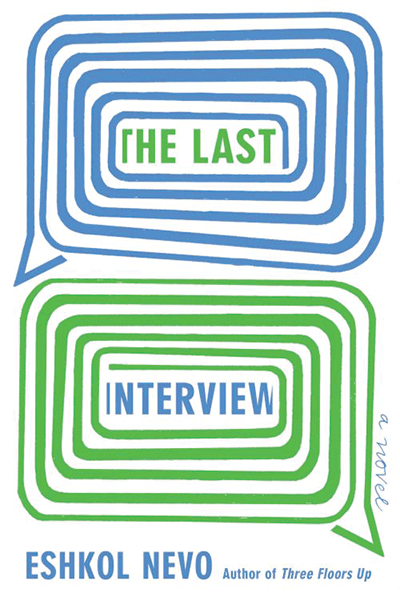Reviewed by NEAL GENDLER
Eshkol Nevo’s writer protagonist has been diagnosed as suffering from dysthymia, but that feeling of chronic mild depression doesn’t lack for reasons.
His tall, beautiful wife, Dikla, is “no longer delighted” in him. Worse, he overhears that she’s putting off a decision about splitting until after daughter Noam’s fast-arriving Bat Mitzva.

His best and apparently only friend, Ari, is dying from pancreatic cancer; older daughter Shira quit speaking to him and has left for a boarding school; his books sell well in Israel but slowly overseas; he secretly writes campaign-winning material that elevates a politician he despises; and he hasn’t started a new book due to writer’s block.
Now, his only writing is to answer reader questions compiled by an internet site. He says the answers will be his last interview after years of being interviewed about his writing and books.
In The Last Interview, officially out Oct.13, he is asked: “How autobiographical are your books?” He replies that he once knew the answer: “I would always respond with blatant lies to protect myself and the people close to me.”
But that grew complicated, he says, because the books began predicting his life events.
“You think you’ve created a far-out plot, something really bizarre. Then a year after the book comes out, the plot becomes reality. Is that autobiography?”
He says his novels always have “bits of autobiography,” but “usually in the female characters. To throw readers off the track.” For this extended interview, he says, he’s telling the sometimes self-damning truth, even admitting to his lies.
So in bits and pieces, out of order, we learn about this fictional writer’s life events and his motivations and feelings during and after them. There’s no reasonable way to summarize the plot, which combines a disjointed autobiography with a chronicle of his current life.
About a third of the way in, I began to wonder why I should care about the maunderings of Nevo’s fictional, tormented writer, which occasionally wander into lies he soon corrects.
But I couldn’t stop turning the pages. I was increasingly engrossed, anxious to read his revealing answers and wanting to know whether his wife, Dikla, forgives him for his adultery in Colombia — which he later says he’d invented — and how he copes with shriveled Ari’s likely death in his early 40s.
Nevo’s character, Eshkol, says he’s named after a grandfather, the oft-underrated Prime Minister Levi Eshkol. Nevo’s first name is Eshkol and internet sources say Nevo is Levi Eshkol’s grandson.
Like the book’s protagonist, Nevo teaches writing; websites say Nevo owns and co-manages Israel’s largest writing school and like his protagonist, once worked for an ad agency. What else might approach autobiography, I haven’t found.
Nor do I know whether Nevo has experienced dysthymia like his protagonist, but he understands it; its aura colors the book. Readers who suffer from dysthymia or depression may need an occasional diversion.
As in his recent Three Floors Up, Nevo masterfully weaves believable characters’ plain-seeming daily lives into fascinating tales.
The deeper I got into The Last Interview, the more I could identify with its protagonist, although I don’t have his troubles. Perhaps it’s because we’re both writers— he with a capital W, an award-winning creator of imaginative tales, me more pedestrian, trying for accurate presentation of reality.
Unlike novelists, newspeople with daily deadlines don’t have time for “writer’s block”; we must start writing. Our work quickly is discarded, but while novelists worry about sales and royalties, our work is sold before writing it and we get paid every two weeks.
But you needn’t be a writer to find some of yourself in the fictional Eshkol, who has traveled, married, raised children and experienced life’s inevitable highs and lows. The deeper you get into The Last Interview, the harder it is to put down.
Its cumulative effect is so powerful that you have to remind yourself that it’s just fiction.
Isn’t it?
***
Neal Gendler is a Minneapolis writer and editor.




















